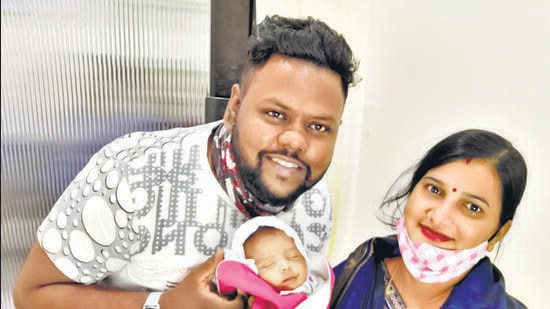All across the world, parents face pressure to abort their unborn babies due to abnormalities detected on an ultrasound screen or genetic testing.
But Shivansh Singh’s parents refused.
Now, the nearly 2-month-old infant from Santacruz, Mumbai, India is thriving at home after a complex surgery saved his life, The Hindustan Times reports.
In December, Shivansh’s mother underwent a routine ultrasound at 24 weeks of pregnancy and learned bad news about her son. Doctors discovered that her unborn baby had a large congenital diaphragmatic hernia, a hole in his diaphragm that caused some of his organs to poke through into his chest, according to the report.
His father, Krishna Singh, said their doctors advised them to have an abortion, but they refused.
“Considering the fetal complications and need for advanced obstetric and neonatal care, we were advised abortion or immediate transfer to a tertiary care medical facility. From that very moment, we were certain that abortion wasn’t an option,” Singh said.
So, instead of making plans to end the baby boy’s life, doctors in the pediatric surgery department at Nanavati Max Hospital, Vile Parle, began planning to save him.
They continued to monitor Shivansh and his mother for nearly three more months before he was born nearly full term on Feb. 28, the report continues.
Click Like if you are pro-life to like the LifeNews Facebook page!
Barely a day later, the infant boy underwent a 3 ½-hour surgery to repair the hole and move his organs into the correct position.
Dr. Kant Shah, a pediatric surgeon at the hospital, told the Times that Shivansh was their youngest surgical patient, and rearranging his organs posed a challenge.
“Usually, … the hole in the diaphragm is located posteriorly,” Shah explained. “Since this hernia or gap was anterolateral and there was no other side to suture the hole together, we had to stretch it around and stitch it to the ribs.”
He said the baby’s heart and liver had been pushed together for so long that they had begun to conjoin, so the surgical team also had to separate the organs. Working on such a tiny patient also was difficult, the doctor continued.
“Performing the task through keyholes measuring merely 3 millimeters was a true challenge,” Shah said.
But baby Shivansh made it through the surgery, and, by the end of March, he was well enough to go home.
“We never lost hope, even when we were informed about the condition of our child the first time,” his father said.








